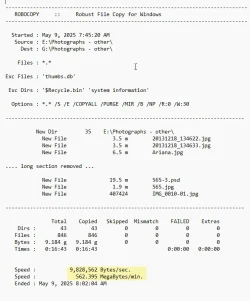I am new to Robocopy and trying to learn as I go. I have two external USB connected hard disk drives, E: is a 10 TB (7.2 TB capacity) drive with 1.96 TB used space, G: is a 12 TB (10.9 TB capacity) drive and is new. The E: drive is 6 years old and I want to replicate the filesystem from E: to G: and continue using E: but occasionally (maybe weekly) keeping G: up to date with the contents on E: The filesystem contains years of photography and video files so the sizes are mostly large with some very large.
I have performed a couple test copies, choosing just one folder for now, to see how robocopy works. My latest attempts have include the /mir switch. I am finding that some time robocopy runs ok and sometimes it is extremely slow. See below two logfiles (middle sections removed to save space), each run copying the exact same files & folders. I have highlighted the speed in each log file. The second run where I am testing (for the first time) the /mir switch runs about 13 times slower. Why? What can I do to speed this up? And what do the times mean at the end of the log file - they don't make any sense to me?


Thanks,
Peter
I have performed a couple test copies, choosing just one folder for now, to see how robocopy works. My latest attempts have include the /mir switch. I am finding that some time robocopy runs ok and sometimes it is extremely slow. See below two logfiles (middle sections removed to save space), each run copying the exact same files & folders. I have highlighted the speed in each log file. The second run where I am testing (for the first time) the /mir switch runs about 13 times slower. Why? What can I do to speed this up? And what do the times mean at the end of the log file - they don't make any sense to me?


Thanks,
Peter
- Windows Build/Version
- Windows 11 Home, 24H2, OS Build 26100.3194
My Computer
System One
-
- OS
- Windows 11
- Computer type
- PC/Desktop
- Manufacturer/Model
- ASUS ROG STRIX Z790 E
- CPU
- i7-13700K 3.40 GHz
- Motherboard
- ASUS ROG STRIX Z790 E
- Memory
- 64 GB
- Graphics Card(s)
- GIGABYTE RTX 3070 Ti
- Sound Card
- n/a
- Monitor(s) Displays
- BenQ SW2700 inch & Dell P1917S





